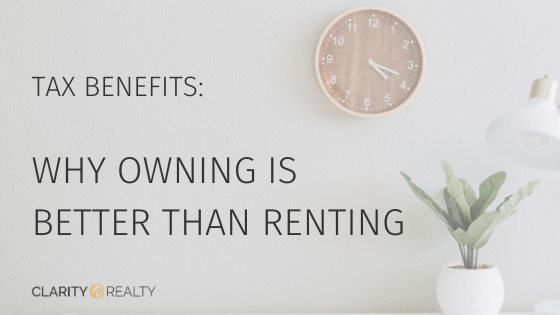
When evaluating tax benefits and deciding whether to rent or buy or whether to invest in real estate or mutual funds – choose real estate! The most significant tax benefit of home ownership is avoiding the capital gains taxes. (A capital gains tax is a tax on the profit from a sale of an asset).
First of all, there have been some changes regarding tax deductions, so let’s clear things up. When you are preparing your taxes, first you have your income. Then, you can either take off your standard deduction or you itemize your deductions – whichever is higher.
Last year a major change came through that raised the standard deduction quite a bit, so if you used to itemize, you probably don’t anymore. Overall, that is better – it’s a higher number! This means that all the things you used to itemize aren’t as important to you anymore – things like real estate taxes, mortgage interests, and charitable contributions.
The tax benefits of those three things aren’t the same as they used to be for a lot of taxpayers. If you’re following, you may be thinking, “I don’t itemize anymore so home ownership isn’t as beneficial.”
You may be right about this from year to year, but don’t overlook the major tax benefit of home ownership that we discussed earlier: avoiding the capital gains taxes.
Let me simplify: whatever money you make on your house, you don’t pay taxes on. (This is huge!)
You have to live somewhere, right? You have to make a monthly payment regardless. So, let’s look at the difference between renting and owning when it comes to taxes.
Let’s say you rent because your rent amount is a little bit less than what your mortgage payment would be. Every month you put a certain amount of money into a mutual fund, and suddenly you do really great and make a decent amount of money.
What’s going to happen is that Uncle Sam is going to take a bit of what you made depending on how long you hold it, etc. This is going to be somewhere between 10-35% of your profit – not a small amount.
Now imagine you own a house and you’re paying a mortgage. Let’s say the value of your home goes up. If your house goes up in value, it goes up even from the money you borrowed from the bank. So, if your home value goes up 5%, it doesn’t just go up on the 10% you put down; it goes up 5% on the $100,000 that the house is.
The money you make on the bank’s money, you don’t pay taxes on! As long as you live there for two tears, you don’t pay capital gains taxes. The only exception is if you make more than $500,000 in gain.
There are a million benefits of home ownership, but this is a major one. When deciding whether to rent or buy, remember to consider how it affects your taxes. And if you rent and are deciding between mutual funds or real estate – choose real estate!
